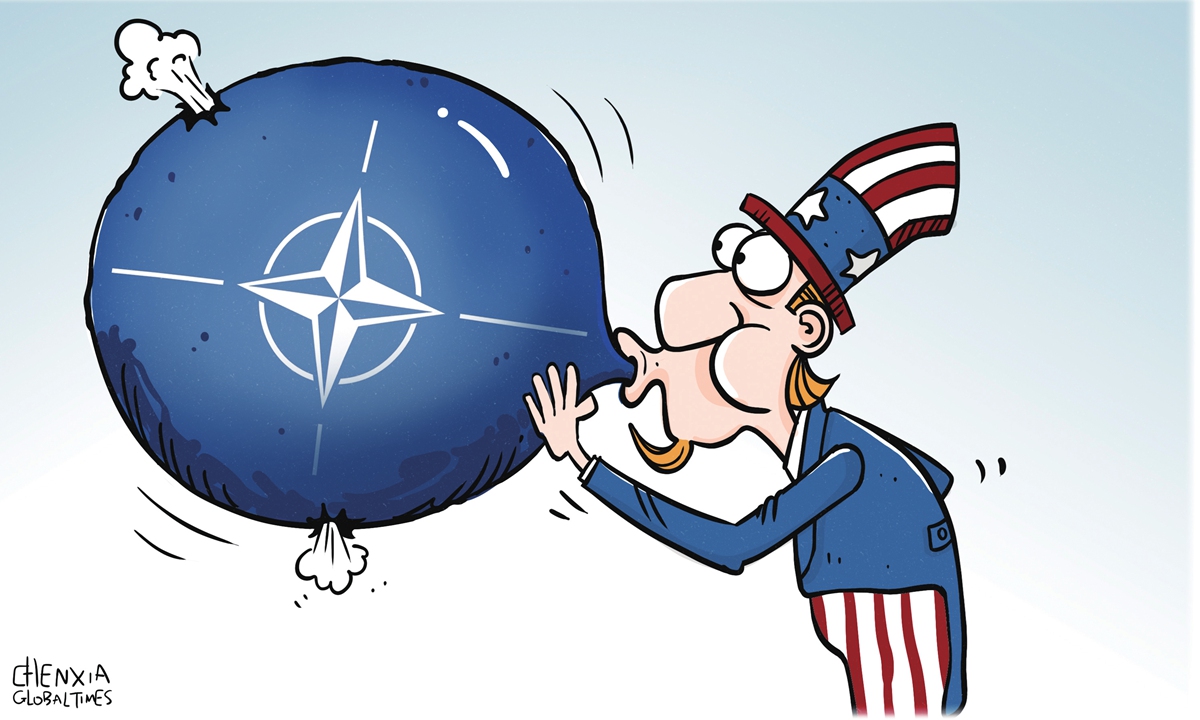NATO attempts to form a coterie in Asia, but internal contradictions hard to overcome

NATO Illustration: Chen Xia/Global Times
Japan, South Korea, Australia and New Zealand are considering holding a four-way summit on the fringes of a NATO Summit in Spain next week, a source close to the South Korean presidential official said Monday. The potential meeting is seen by the four countries as an attempt to keep "an assertive China" in check in the Indo-Pacific where Beijing "has been expanding its influence."
The four countries have been included in NATO's nine "partners across the globe" for many years. The proposed meeting during the summit is a NATO attempt to expand its influence at regional and global levels by repackaging and making use of its global partners. NATO intends to extend its tentacles from the Atlantic to other regions like the Asia-Pacific, so it is imperative to bring in partner countries and promote establishing another "gang" in the region.
The 2021 NATO Summit explicitly identified China as posing a "systemic challenge" to NATO. This time, with an obvious intention of containing China, it attracted countries like Japan and South Korea that are very close to China geographically and have intertwined interests, trying to build a prototype of an "Asian mini NATO" in the Asia-Pacific. For this purpose, NATO is bound to set a target to be vigilant against, in order to give meaning to its attempt to gang up on and pressure China.
The four countries are representative in the Asia-Pacific from the perspectives of values and geopolitical concerns. In addition, there are complex security interests between those countries and China, so NATO picked them as a group to hold China in check in terms of security. Besides, during his trip to Japan recently, US President Joe Biden proposed the Indo-Pacific Economic Framework, in which the four countries play important roles. This makes it apparent: if the countries can be mobilized as a small bloc, a siege posture against China in both economic and security spheres will be formed.
However, whether it works is still a question regarding the four-way summit that Japan proposed, and the four countries' ability to create a buzz in international public opinion is unknown. After all, the four countries are not a monolithic group, since New Zealand is relatively autonomous in its diplomacy and will not necessarily be compelled by countries like Japan and Australia to get involved in an exclusive and purposeful coterie aimed at China.
As a Cold War bloc whose main purpose is creating military confrontation, NATO faces many internal contradictions and crises for its survival and must prolong its life by hyping the threat of Russia and China. Japan, South Korea, Australia and New Zealand, as Asia-Pacific countries distant from NATO, are unlikely to risk threatening their own stable development to match the geo-strategies of the US and NATO as a bloc.
Even if they want to form their own coterie, these nations will thoroughly learn from NATO's lessons in the past. They will not repeat the mistakes of the transatlantic military alliance and establish a NATO-like group in a complete sense. The possibility they will seek to build a multilateral community in military and security cannot be ruled out, but there is not much cohesive force between these countries. Since divergences have emerged within NATO, the four countries are unlikely to unite.
Moreover, these nations hold different views on many issues. In terms of security concerns, for example, rather than the "China threat," South Korea focuses mainly on the issue of North Korea, and New Zealand on Australia's domination and hegemony in the South Pacific region.
In terms of intentions, Japan would certainly love to see a NATO-like organization in the Asia-Pacific because it wants to play a crucial role in the containment of China. Australia, which has signed the AUKUS pact, has grand regional military ambitions. But that is not the case for South Korea and New Zealand. In addition, most nations in the Asia-Pacific are unlikely to support the idea of forming a clique between the four countries.
As countries with relatively great motivations, Japan and Australia share quite close bilateral relations in military and security, the degree of which is only lower than that of the US and Japan. Also, there is already a quadrilateral mechanism between the US, Japan, India, and Australia, so we should stay alert to prevent Tokyo and Canberra - as Washington and NATO's puppets - from establishing military blocs.
The author is an associate research fellow at the Center for Japanese Studies, Fudan University. opinion@globaltimes.com.cn


